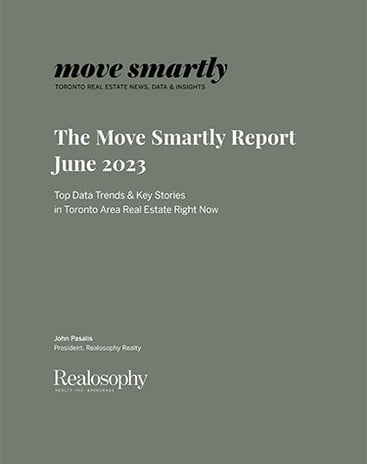This was the first month since last June that saw house prices increase year-over-year.
As Featured in this month's Move Smartly Report:
The Market Now
Year-over-year, the average price for a house in the Toronto area was $1,472,879 in May, up 2% over the same month last year. Last month's median house price was $1,295,000, up 4% over last year. This was the first month since last June that saw house prices increase year-over-year.
House sales in May were up 18% over last year, the first time since November 2021 that sales are up on a year-over-year basis. New house listings were down 19%, and the number of houses available for sale at the end of the month, or active listings, was down 25% over last year.
This imbalance between supply and demand is reflected in the Months of Inventory (MOI), which is a measure of inventory relative to the number of sales each month (for a more detailed explanation of this measure, see the Monthly Statistics section later in this report). In May, MOI for houses remained relatively flat at 1.3 MOI, indicating tight supply conditions.
The average price for a condominium (condo) in the Toronto Area was $778,428 in May, down 2% over last year. The median price for a condo in May was $700,000, down 3% over last year.
Condo sales in May were up 39% over last year, while new condo listings were down 14% over last year. The number of active condo listings was down 12% over last year. The MOI remained flat at 1.6 MOI in May, indicating that supply is slightly less constrained for condos than for houses, which makes sense given there is slightly less of an imbalance in listings and demand for condos.
For detailed monthly statistics for the entire Toronto area market, including house, condo and regional breakdowns, see the final section of this month's report.
Join me as I present all of the report data and key insights into the Toronto area real estate market in an online live update & Q/A on this Thurs June 15th 12PM ET - details below.
FREE MONTHLY WEBINAR: The Market Now with John Pasalis - Thurs June 15th 2023 12PM ET
Register now to get recording of latest session and access to future sessions.
On the Ground: The Housing Market is Still Hot but Likely to Cool
Toronto’s housing downturn didn’t last very long.
Toronto area house prices peaked in February 2022 at $1,679,429; by July 2022, prices had fallen by 23% to $1,285,222. Average prices remained flat for the second half of 2022, but accelerated in 2023. The average house price in May was $1,472,879, up by $200K since January and up 2% over last year.
This dramatic rebound in house prices has largely been due to a shortage of listings. Last month there were 5,474 active detached listings available for sale in the Greater Toronto area. That was the second-lowest number of active listings for May going back to 1996.
The lack of inventory is driving the intense competition we continue to see on the ground, with two-thirds of all houses selling above the seller’s list price.
Condos have also seen prices recover, with the average sale price of a condo up 10% since the start of the year and down just 2% over last year. While the condo market is still a seller’s market, it is less competitive than the market for houses.
In spite of this run up in prices, I expect the market to start to cool down and price growth to moderate in the months ahead. The summer months are typically much slower than the spring market; many active buyers pause their search to take a break after months of frantic searching and lost offer nights.
And beyond these reoccurring seasonal trends, the Bank of Canada’s (BoC) decision to increase its policy rate by 25 basis points this month will likely put a bit of a chill on Canada’s housing market.
Typically, a single 25 basis point increase in the BoC’s policy rate should not impact the housing market much, especially when most buyers are getting fixed-rate rather than variable-rate mortgages. But this increase is having two negative side effects on the housing market.
Firstly, bond yields (and, by extension, fixed mortgage rates) have been trending up over the past month, and this recent BoC rate increase caused bond yields to increase even further. Fixed mortgage rates are now well into the 5% range, which will increase borrowing costs, making it harder for some buyers to qualify for a mortgage.
Secondly, this increase will likely have an even more significant impact on market sentiment. When buyers rushed back into the market at the start of 2023, the sentiment was positive because most buyers believed that the BoC was done hiking interest rates and that rates would start to decline sooner rather than later. Buyers hoped that by jumping in while rates were still high, they would avoid any price acceleration caused by any future interest rate cuts. But this demand boom caused prices to accelerate even as rates remained at their elevated levels.
However, the latest increase, and the possibility of another increase later this year, is making it more apparent that not only is the BoC not done raising rates, but that interest rates will likely stay high for longer than many households expected. The recent increase in home prices and the expectation that interest rates will not be cut any time soon will help cool the urgency we saw from buyers earlier in the year.
While I’m not expecting any dramatic shifts in the market any time soon as inventory levels are still at historic lows, we should see the competition in the market moderate in the months ahead.
Browse Real-Time Market Trends on Movesmartly.com:
See Market Performance by Neighbourhood Map, All Toronto and the GTA
Greater Toronto Area Market Trends
Top Image Credit: Getty/iStock
The Move Smartly monthly report is powered by Realosophy Realty, an innovative residential real estate brokerage in Toronto. A leader in real estate analytics, Realosophy educates consumers at Realosophy.com and MoveSmartly.com and helps clients make better decisions when buying and selling a home.
John Pasalis is President of Realosophy Realty. A specialist in real estate data analysis, John’s research focuses on unlocking micro trends in the Greater Toronto Area real estate market. His research has been utilized by the Bank of Canada, the Canadian Mortgage and Housing Corporation (CMHC) and the International Monetary Fund (IMF).






